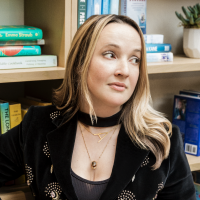Melissa Flashman of Janklow and Nesbit

It might seem a bit fanciful, but I recommend that writers consider cadence—that modulation of voice and pace that produces a work’s rhythm.
Jump to navigation Skip to content
A dependable source of professional and creative advice, this regular series features anecdotes, insights, tips, recommended reading and viewing for writers, and more from leading agents and editors.

It might seem a bit fanciful, but I recommend that writers consider cadence—that modulation of voice and pace that produces a work’s rhythm.

In my opinion, writers should never worry about trying to explain anything. I’ve recently been editing Jeffrey Zuckerman’s translation of Carl de Souza’s fever-dream of a novel Kaya Days, which takes place during the 1999 riots in Mauritius after the death of the musician Kaya in police custody. The protagonist is a teenaged girl trying to find her brother in a suddenly broken city, and she just doesn’t have the vocabulary to make sense of what she’s seeing.

My question to writers is always, “Do you know why you wrote this book and why it was important to you to tell this story?” I might not ask it directly, but in every part of our conversation, it’s the question that I’m hoping you are able to answer implicitly. When you start a project, it’s okay to not know where it’s going or exactly what it’s about, but one way of knowing whether your book is ready for an agent’s eyes is to test how clearly you can articulate the answer to that question, to yourself and to the larger world.

Publishing a book is not a race, though it can often feel like one. I really empathize with the sense of pressure many writers might feel to produce, or the perception that the success of their book doesn’t “measure up” to another’s, especially when scrolling through social media. I imagine that for many writers it can constantly seem like there’s a rush to finish a project, to remain visible and relevant.

Book publishing reminds me of the 1982 animated film The Last Unicorn, in that the industry is aspirational and dreamy but can also be nonsensical and anachronistic, not to mention strangely paced. (A prog rock children’s cartoon? Starring Alan Arkin and Mia Farrow? In 1982? But I digress.) Going in, the best gift a writer can give themselves is this: expectations management. You should expect uncertainty—a lot of uncertainty. Expect that you will need to be patient.

Let’s get the most obvious advice out of the way: Read the submission guidelines! This is mentioned on every editors panel I have participated in, and with good reason. Read the guidelines thoroughly—hell, read ’em twice, all the way through. While you’re at it, also read the publications you’re submitting to. Is it possible to read everything published by each magazine you’d love to be included in? Probably not. Can you read the three most recent pieces, or find three pieces relevant to your own submission, for each magazine you’re reaching out to?

“Know your audience” has become a tired maxim. In my view, good writers know themselves. Being your own audience is much more likely to improve your craft. Making observations of the world from your unique perspective allows you to find your voice. If your work is genuine, it will resonate with people. How many times have you read something that conveys exactly what you’re feeling in a new and exciting way? That’s what makes books engaging. Taking the time to understand your personal character and setting can contribute greatly to creating imagined ones.

Writers are often told to develop a writing community. It’s certainly crucial to find fellow writers with whom you share a sense of trust, camaraderie, and accountability, but I’d like to advocate for developing your non-writing communities as well. Call an old friend, commit time to a grassroots organization, or pick up groceries for your neighbors. Becoming part of something larger than yourself and intentionally creating time away from your writing makes your relationship to your work more sustainable and, I think, more joyful.

Years ago I took a Catapult writing workshop with Chelsea Hodson. (Bonus recommendation: If you have the opportunity to study with Chelsea, take it. Her workshop completely changed how I approach writing.) Early on in the course, she recommended that we take some time away from our work, especially when we’ve run into a wall. This advice was so counter to what I’d heard in other workshops, where I’d been encouraged to write every day, no matter what.

This industry tends to wave away its corporate, transactional truths in favor of platitudes about passion and how lucky we all are to be here. But this illusion curdles when the lived experience of publishing a book breeds the same ungenerous anxieties of our high school years: over who gets to be a cool kid, whose success makes you feel insecure, who is getting what you want. Suddenly, this industry that demanded you align your worth with your work is whispering behind your back about how fugly your jeans are. (OK, fine. This is a ham-fisted metaphor, but stay with me.)